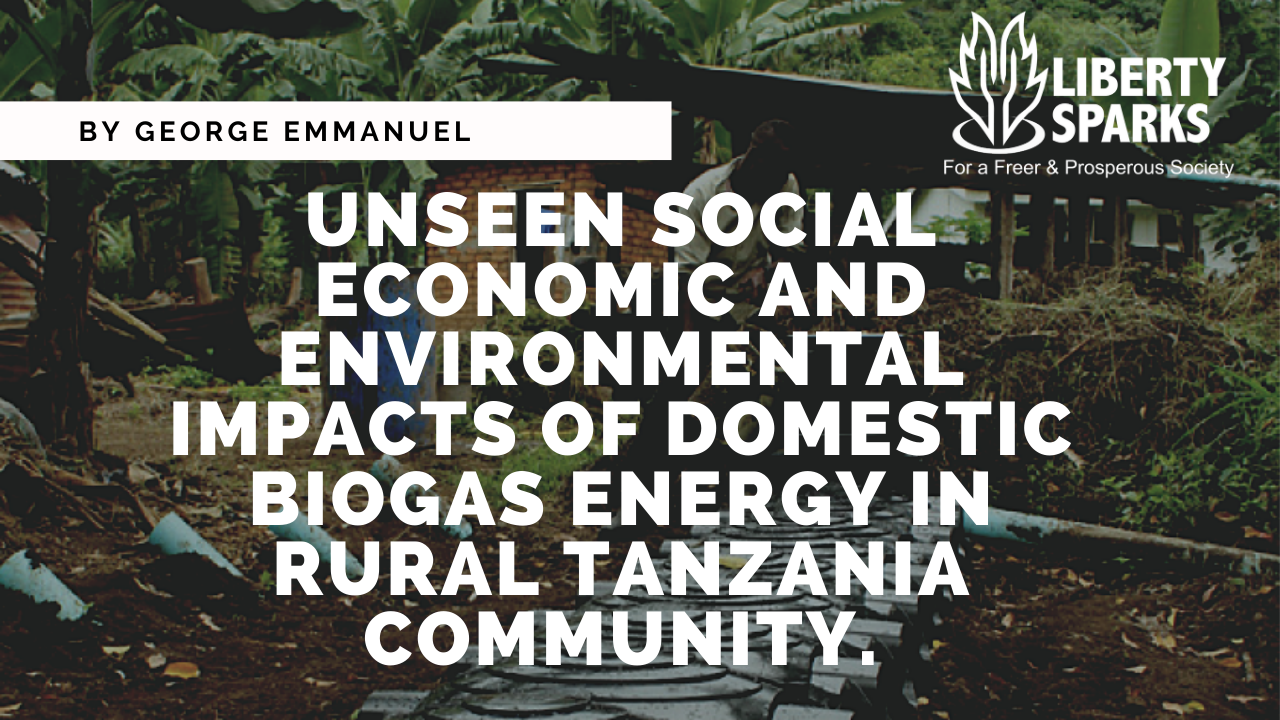
UNSEEN SOCIAL ECONOMIC AND ENVIRONMENTAL IMPACTS OF DOMESTIC BIOGAS ENERGY IN RURAL TANZANIA COMMUNITY.
[et_pb_section fb_built=”1″ _builder_version=”3.0.47″][et_pb_row _builder_version=”3.0.48″ background_size=”initial” background_position=”top_left” background_repeat=”repeat”][et_pb_column type=”4_4″ _builder_version=”3.0.47″][et_pb_text _builder_version=”3.21″ background_size=”initial” background_position=”top_left” background_repeat=”repeat”]
It’s about Technology; the case for biogas
We are living in an era of massive technological development. This means every day the world witnesses different discoveries and technological breakthroughs, while on the other hand enormously degrade our environment, lose biodiversity, pollute (air, water, land and noise) and cut down millions of trees. These all play a part in affecting climatic change.
The United Nations IPCC (The Intergovernmental Panel on Climate Change) report of 2018 give the room to take positive environmental steps to reduce climate change impact before it becomes irreversible by 2030.Further US National Oceanic and Atmospheric Administration in May 2019 reported that global atmospheric methane levels have risen from 1650ppb (parts per billion) in 1985 to over 1860ppb today and continue to rise.
Alternative Energy Sources
The efforts are building upon the government (both developed and developing countries) to improve their climate policies and practices. Although there is still an awful gap between what is needed and what we are primarily committing by limiting global warming to 1.5⁰C by 2100, the current efforts are not yet satisfactory. This report pinpoints the potential for the world to adopt alternative sources of energy.
It is with no doubt that, the future of clean energy is possibly in the bio gas industry as it reduces GHG (Greenhouse Gas) emissions by capturing the methane that would otherwise have entered the atmosphere from rotting food waste, sewage, farm wastes and agro-industrial process wastes.
Capturing this methane and transforming it into electricity, heat or fuel are processes that have matured and are rolled out in many countries on small and large scales.
Steps for Tanzania
The energy can be directly used for domestic activities such as in stoves for cooking and lighting after minor treatment, Carbon dioxide may be extracted for commercial use as the feed stock in the greenhouse and bio methane to be used as fuel in gas–powered vehicles.
Tanzania was never left behind since 1975 SIDO (Small Industries Development Organization) introduced the domestic biogas. Until 2007, over the 29,000 biogas installations have been placed
In 2008 the SNV ( Stitching Nederland’s Vrijwilligers (“Foundation of Netherlands Volunteers”) agreed to make available fund of € 200,000 as of the start-up fund for the biogas energy.
The program was aimed to support the rural livelihood and quality of life, whereby the first phase aims to build 12,000 new biogas plants with a capacity of 31 MW, producing energy to the tune of over 110,000 MWh in nationwide and 95 per cent of the constructed biogas plants are operated properly.
The program managed to reduce the GHG emissions with 60 kt and avoid deforestation for almost 8,00 hectares of the forest. Also, the bio–slurry—which is a significant manure matter for farmlands, an estimate of 65kt of organic matter as organic fertilizer for almost 72,000 beneficiaries have been made.
The biogas Promise
Over time and space collection efforts of domesticating biogas technology,are witnessed in all three aspects of sustainable development: economic, social and environment.
The domestic biogas digester contributes to economic development because it reduces expenses of domestic energy, reduces foreign exchange demand, application of bio-slurry promotes yield quality and reduces the application of synthetic fertilizer and it creates employment.
The domestic biogas contributes to social development because it reduces domestic workload especially for women and girls, respiratory illnesses and improves awareness on alternative farming and animal husbandry practices (Tanzania Domestic Biogas Program Report 2019).
Finally, the biogas contributes to the environmental impact on how it reduces the emission of greenhouse gases, improves soil texture through bio-slurry and improved manure management practices.
The war against greenhouse gases is upon us all—as the Tanzanian community to ensure we play our fair part in reducing our carbon footprint and adopting green energy technologies, that are reliable, cheaper and environment friendly
[/et_pb_text][/et_pb_column][/et_pb_row][/et_pb_section]



Digital Payment as a Way to Increase the Freedom to Make Payments